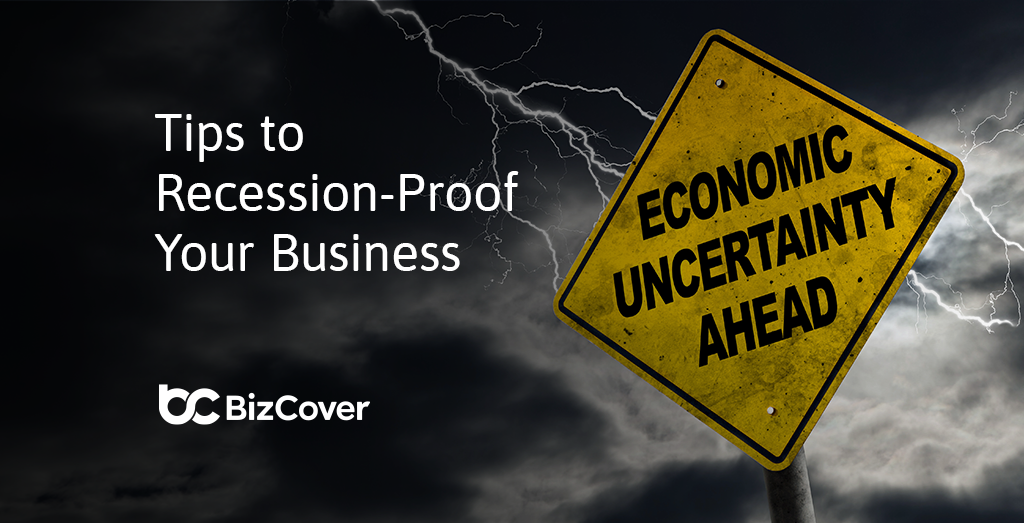Weathering the economic downturn: Strategies for small businesses to thrive amidst recession
There are many economic influences on a business, and recessions can be one of the more impactful of all. More often than not, recessions are bad news for small businesses.

For small business owners with little cash reserves, the general economic belt-tightening and price rises that come with a recession can make it even harder to secure work and get materials at fair prices. A recession can even make your daily commute more costly.
It’s not all bad news though. With the right preparation, such as regularly reviewing your business finances, watching your cashflow forecasting, and protecting your business with Business Interruption and a Business Insurance Pack, you will give your business the best chance for long-term success.
Being equipped now will help you streamline your business, get it working more efficiently, and ultimately see it delivering more value – all of which is great, especially in a recession. So, let’s dig into some handy tips to survive a recession.
What is a recession?
So, what is a recession, and is a recession good or bad? A recession is a period of economic decline, which is usually defined as two consecutive quarters with negative growth in real GDP. The majority of recessions last only a few weeks, but some can take several years to recover. A recession is one of the major economic influences on a business and can lead to an economic downturn.
So, what is the business economy impact of a recession and what does a recession look like? Well, here are some key indicators of a recession:
- broad job losses across various industries;
- a manufacturing slowdown;
- a decline in consumer spending; and
- a decline in real income.
How does a recession affect small businesses?
While some industries are hit harder than others during a recession – like luxury travel, hospitality, and retail – most businesses feel the pain of an economic downturn.
While recessions are usually only a few quarters long, their effects can last for much longer. Here are a few examples of how a recession could affect your small business.
Reduced profits
Consumers and competitors are more cautious about spending as economic growth slows. Your business may find it harder to make its usual sales and you may need to reduce costs. Businesses may be less inclined to invest in new products. Employees might also be laid off, and overheads will likely decrease to compensate for the loss of profit.
Credit crunch
Business owners and consumers are becoming more careful with their spending. Lenders may also tighten their belts in a recession, making it harder for businesses to get the credit they need. Interest rates may increase and lending criteria might be stricter.
Cash flow woes
In a recession, both vendors and customers find it harder to pay on time. It is possible that businesses will spend more time tracking down invoices and delaying payments to their suppliers. It can be especially difficult for B2B businesses. Bills may not be paid if one of your clients goes out of business.
Stock prices and dividends decline
Your quarterly earnings report, as well as your official financial statements of your business, will eventually reflect a reduction in profit and cash flow. Dividends may even disappear or decrease at this point. As stock prices fall, shareholders may even demand a new leader.
Decline in product quality
A global recession can have a knock-on effect on your product quality. Business owners will look for ways to reduce costs and increase profits as manufacturing slows and bills are not paid. This may lead to a temporary drop in the quality of your service or products if you cannot afford to maintain your normal standards.
The upside of a recession
Believe it or not, but there are some silver linings in a recession. The inflation rate drops and the borrowing rates remain low. You can benefit from lower repayments if you are able overcome the obstacles of financing.
Businesses can also reinvent themselves during a recession by finding innovative ways to reduce costs. To protect your interests, you might try a different business model that has lower costs. As some businesses close, the competition may be reduced. So, is a recession good or bad? Well, it can be both, depending on where you’re coming from.
Recommended reading: 5 ways to protect your small business against inflation
Small business tips to survive a recession
When an economic downturn looms, the business economy impact can pose serious challenges for small business owners.
How can you make the most of these positives and avoid becoming a victim of the recession? How will you overcome the next economic downturn? Well, here are some tips that can help.
Regularly review your finances
Don’t wait for a recession to come knocking before you take stock of your business finances. If you aren’t doing it already, consider monthly or quarterly reviews of your business finances.
Your small business can benefit from having a well-thought-out budget in place to help you avoid running into financial trouble, which may force you to reduce the number of products and services you can offer. You may even be forced be to lay off some of your staff.
Recommended reading: Guide to small business financial health
Protect your business today
Small business owners know just how challenging business ownership can be. When the economy is facing a recession, you may benefit from reviewing your Business Interruption policy and your business insurance pack coverage.
Choose the business insurance policies that will most suit your situation. And you may include Public Liability to ensure you are not financially responsible for the costs of a legal claim should a third party get injured or suffer property damage while you are doing business.
Use cashflow forecasting to avoid nasty surprises
A cash-flow forecast will help you to predict your future financing requirements.
It’s important to take stock of your existing talent. You may want to avoid any redundancies, but a hiring freeze is likely during a recession.
You can mitigate these effects by focusing on how you use current talent via competent management. Use data-driven metrics for tracking performance, identify potential leaders, and engage in team-building exercises that are reassuring.
Plan for recessions and make your business recession-proof
While no business can completely avoid the effects of a global economic downturn, there are some ways to prepare. Prepare for different scenarios by putting in place crisis management procedures. Strong customer service will help you to maintain client relationships in these difficult times.
With long-term planning, and an understanding that economic recessions don’t last forever, you can survive a recession and the temporary setbacks that come with a recession.
Make business insurance easy with BizCover
At BizCover we make small business insurance easy for small business owners by taking the hassle out of purchasing business insurance. Compare competitive business insurance quotes from leading Australian insurers, purchase Business Insurance in as little as 10 minutes and be on your way.
Call BizCover today on 1300 920 873 to find out how we can help you reduce your exposure to risk and purchase your Business Insurance in as little as 10 minutes and get back to running your business.
© 2023 BizCover Pty Limited, all rights reserved. ABN 68 127 707 975; AFSL 501769
This information is general only and does not take into account your objectives, financial situation or needs. It should not be relied upon as advice. As with any insurance, cover will be subject to the terms, conditions and exclusions contained in the policy wording. © 2025 BizCover Limited.





